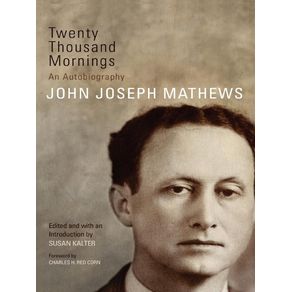When John Joseph Mathews (1894-1979) began his career as a writer in the 1930s, he was one of only a small number of Native American authors writing for a national audience. Today he is widely recognized as a founder and shaper of twentieth-century Native American literature. Twenty Thousand Mornings is Mathews's intimate chronicle of his formative years. Written in 1965-67 but only recently discovered, this work captures Osage life in pre-statehood Oklahoma and recounts many remarkable events in early-twentieth-century history.
Born in Pawhuska, Osage Nation, Mathews was the only surviving son of a mixed-blood Osage father and a French-American mother. Within these pages he lovingly depicts his close relationships with family members and friends. Yet always drawn to solitude and the natural world, he wanders the Osage Hills in search of tranquil swimming holes--and new adventures.
Overturning misguided critical attempts to confine Mathews to either Indian or white identity, Twenty Thousand Mornings shows him as a young man of his time. He goes to dances and movies, attends the brand-new University of Oklahoma, and joins the Air Service as a flight instructor during World War I--spawning a lifelong fascination with aviation. His accounts of wartime experiences include unforgettable descriptions of his first solo flight and growing skill in night-flying. Eventually Mathews gives up piloting to become a student again, this time at Oxford University, where he begins to mature as an intellectual.
In her insightful introduction and explanatory notes , Susan Kalter places Mathews's work in the context of his life and career as a novelist, historian, naturalist, and scholar. Kalter draws on his unpublished diaries, revealing aspects of his personal life that have previously been misunderstood. In addressing the significance of this posthumous work, she posits that Twenty Thousand Mornings will challenge, defy, and perhaps redefine studies of American Indian autobiograph

